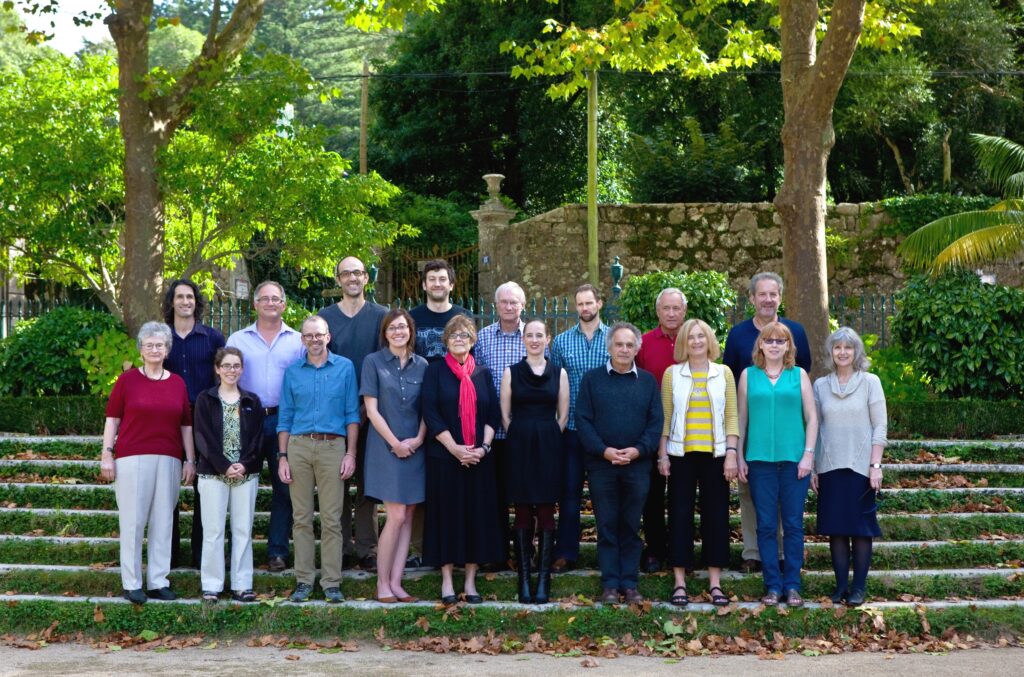Integrating Anthropology: Niche Construction, Cultural Institutions, and History
Date
Oct 16-22, 2014Organized by
Agustin Fuentes and Polly WiessnerLocation
Tivoli Palacio de Seteais Hotel, Sintra, PortugalPublications
Reintegrating Anthropology: From Inside Out,. Current Anthropology, Vol. 57, S13, June 2016.Participants
- Leslie Aiello Wenner-Gren Foundation, USA
- Scott Atran CNRS-Institut Jean Nicod, Ecole Normale Superieure, France
- Alan Barnard University of Edinburgh, UK
- Douglas Bird Stanford University, USA
- Maurice Bloch London School of Economics, UK
- Kathryn Coe Indiana University-Purdue University, USA
- Greg Downey Macquarie University, Australia
- Agustin Fuentes University of Notre Dame, USA
- Lee T. Gettler University of Notre Dame, USA
- Ashley Grimes University of Utah, USA
- Barry Hewlett Washington State University, USA
- Pierre Lienard University of Nevada-Las Vegas, USA
- Cristina Moya London School of Hygiene and Tropical Medicine, UK
- Benjamin Purzycki University of British Columbia, Canada
- Mary Shenk University of Missouri, USA
- Beverly Strassmann University of Michigan, USA
- Polly Wiessner University of Utah, USA
ORGANIZER’S STATEMENT: All anthropologists, cultural, biological, archaeological, primatological, and evolutionary, are interested in why humans do what they do. In past decades, anthropologists, and particularly those in North America, mainly worked across disciplines drawing on many applications of evolutionary, economic, and cultural theory: control of energy and cultural evolution, cross-cultural comparisons to derive scientific principles, multilinear evolution, specific and general cultural evolution, cultural ecology, and formalist and substantivist economics.
In the 1980s and 1990s a broad diversity of new theoretical approaches emerged. More humanistically oriented anthropologists in North America and elsewhere, rejecting metanarratives, focused on the role of history and how humans create complex cultural meanings and realities. Scientifically oriented anthropologists focused on evolutionary and biological influences. Many such evolutionarily-oriented approaches were strongly criticized (rightly and wrongly) for being overly reductionist in their focus. Hostilities grew and even in North America, where the Boasian tradition of broad-based anthropology was the norm, some departments split and the discipline divided.
These divisions are devastating to anthropology’s ability to confront the many critical problems in the world today. There are pressing issues that demand generous engagement between ethnography, social theory, evolutionary theory, biology and socioecology. These include globalization, environmental degradation, growing inequalities, the impacts of new technologies, and social strife.
The many methodologies and theoretical investments of our diverse practitioners have led to rich understandings of human beings and being human, but at different explanatory scales. Human behavior results from acquiring information at multiple levels: genetic, epigenetic, ontogenetic and via cultural institutions. To integrate these perspectives we need a starting point. One useful place to begin would be a niche construction perspective expanded beyond the basal ecological and biological to include ethnographic realities, relationships between groups, and cultural institutions. By cultural institutions we mean ‘systems of rules, beliefs, norms and organizations that together generate regularity of (social) behavior’ (Greif 2006 30). Humans construct ecological, technical and cultural niches that structure the selective landscapes. These niches channel the strategies of human actors and in turn are modified by human agents. History matters because change is built on what went before.
The goal of this conference is to assemble researchers working across sub-fields and theoretical orientations and invite them to present their work in the context of history, niche construction, social institutions and the selective landscape. We hope to develop ideas for integrating anthropology that run deeper than many current “biocultural approaches,” and realize these ideas via concrete case studies and innovative methodologies. The framework we are seeking to build will include evolutionary influences, ethnographic realities, ecological niches, technologies, and cultural institutions. We need to explain gene-culture interactions as well as the sources of enormous cultural diversity in human societies. Research strategies to address the big questions require theoretical plurality and diverse methodologies. This mode of integrating approaches in anthropology will have much to offer the discipline, the academy, and society.
Current Anthropology supplement on the UCP website
Wenner-Gren Symposium #150
